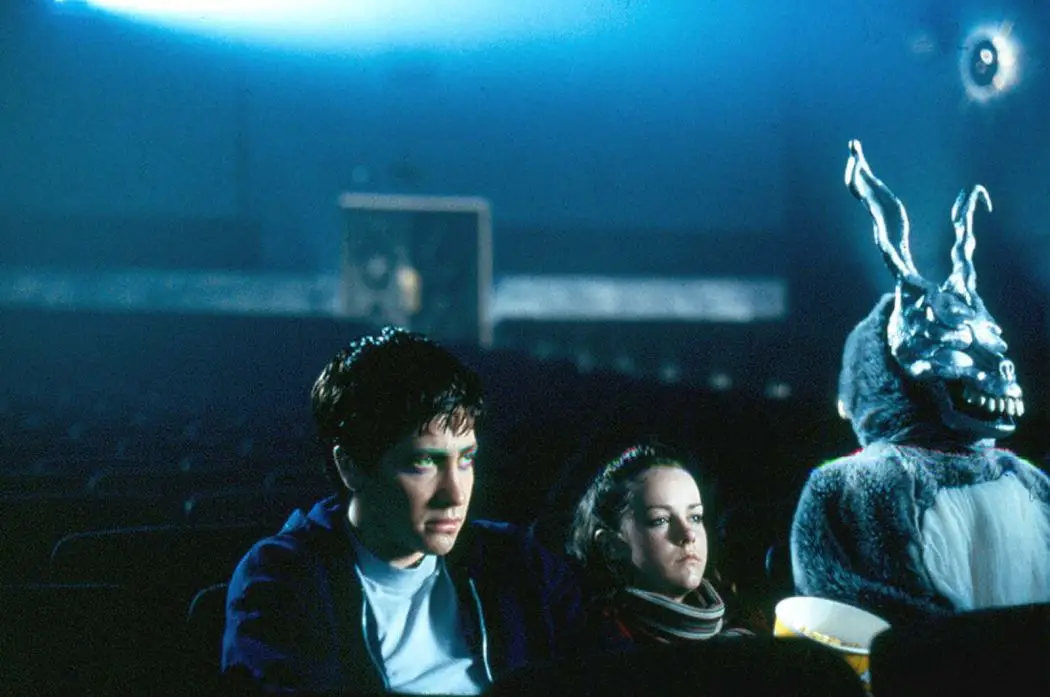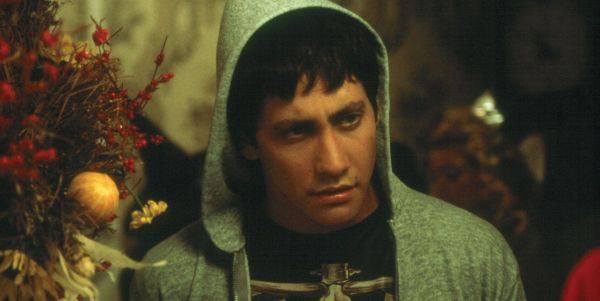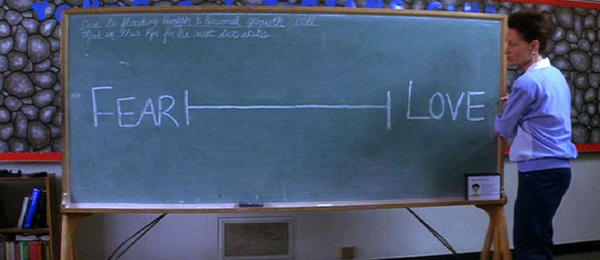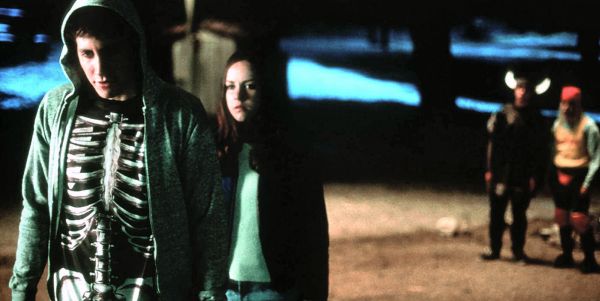DONNIE DARKO 15th Anniversary: The Themes Of A Cult Classic

Michael Pementel is a Columbia College Chicago graduate of the…
Richard Kelly’s sci-fi drama celebrates its 15th anniversary since its release in 2001. Ranking among many publications’ “Greatest Films of All Time” lists, Donnie Darko has garnered both critical and cult success.
The film follows teenager Donnie Darko as he strives to make sense of the doomsday visions that come to him. Donnie is first visited by a man in a bunny costume called Frank, who shares with him that the world will end in 28 days. From there, Donnie’s tale twists and turns with studies and revelations of time travel, and how they play into the coming doomsday.
The picture typically receives the majority of its commentary based around its complexity. While revisiting the picture for its anniversary, I’ve come to find Donnie Darko a little more direct then it may appear. Certainly it is shrouded in layers of philosophy that require research, but at its core, this is a work that explores sensitive human matters – far beyond time travel.
Donnie Darko – Just Another Teenager
For as bizarre as the narrative of the film gets, the themes of Donnie Darko are far more simple. Richard Kelly, in using the sci-fi elements of time travel, aims to help the character of Donnie answer and explore the film’s themes of puberty and rebellion.

Small context clues are given all throughout the picture: Donnie going to therapy, Donnie’s “past”, Donnie’s abruptness at dinner or among his teachers, et cetera. Donnie is the black sheep among his community, he is the Holden Caulfield of his Virginia suburbia. One could write Donnie off as another angst-ridden teen, or the intellectual trapped in the small town of right-wing values. Donnie is that archetype of anxiety and anger, embodying the mindset of being a teenager.
Donnie’s outbursts, depression, and thoughts present the struggles that teenagers are trying to figure out on their own at that time in their lives.
Puberty
Donnie is eventually introduced to the film’s love interest, Gretchen. Well before they meet, though, Donnie expresses his interest in girls, imagining sleeping with girls while in school, and even attempting to masturbate during therapy. When Gretchen and he begin to date, they grow closer, and she becomes a source of comfort for him. This is pivotal when considering the context of Donnie’s drama with Frank, and disconnect towards family.
The Darko family is a caring and fun household, but with a distance in addressing serious matters. Donnie’s acts of rebellion are met with reward, his father forgets the name of his doctor, and his mother brushes off Donnie after he calls her a bitch. Like most teenagers going through rebellion, the family becomes a means for kids to flee. It is an act that symbolizes independency, and the beginning of finding one’s own coping mechanisms.
It is also the time when kids begin to explore love and relationships, diving further into their identities of sex and gender. Gretchen becomes Donnie’s gateway into these feelings, all from the moment they begin to joke, up through when they have sex for the first time.
Donnie and Gretchen are two somber souls, wanting to be accepted and cared for outside of family. When Donnie first attempts to kiss her, she pulls away. Gretchen begins to explain her actions, when Donnie acknowledges she wants the time to be right, and states, “When it reminds you how beautiful the world can be?” Later on, after being bullied, Gretchen pulls Donnie into her as they kiss, and the line is repeated.

In one moment where all feels like pain, Gretchen and Donnie embrace, and her suffering fades away. This beauty captures the magic of young love, and the transformative power it carries in escaping life’s troubles.
Towards the end of the film that Gretchen is killed by a drunk driver. At this point, time is nearing towards its warning of “the end” that was stated at the beginning of the picture. As the clock counts down to everyone’s final moments, Donnie finds that he has lost the one person that made him feel hope.
Donnie and Gretchen explore love, finding solace within the other. Their bond becomes a rock in their crazy world of a backwards thinking community and sadness. The film shows how these two outsiders, for all their angst and quietness, lighten up whenever they are around the other. Donnie Darko looks into the struggles and peace that young love promises for so many, and displays how the loneliest soul can find their other half.
Rebellion (Love vs. Fear)
Donnie is an intelligent kid. He is looked down on by his principal and gym teacher for his outward aggression, but admired by his science and English teachers for his brilliant madness. Donnie is the art lover or rabid book reader we all knew in high school (or even the kid we were).
The Darko’s, Gretchen, along with said English and science teachers, are the counterpoint to the film’s suburban community. There is a particular subplot that takes place within the midsection of the picture in regards to fear. The school’s gym teacher becomes infatuated with a motivational speaker, whose shares his views on “living a life with no fear”.
There comes an exercise during class where the gym teacher hands out papers with specific situations, and asks the students to state whether the situation is that of fear or love. When it’s Donnie’s turn to share his answer, he states that he “doesn’t get it”, and that, “Life isn’t that simple”.

The gym teacher states, “Fear and love are the deepest of human emotions.” To which, Donnie replies, “Okay, but you’re not listening to me. There are other things that need to be taken into account here, like the whole spectrum of human emotion. You can’t just lump everything into these two categories and then just deny everything else.”
Another key scene is when Donnie comes face to face with the motivational speaker. During a school presentation where school kids ask questions on how to tackle certain life problems, Donnie takes up the microphone, and begins to have it out with the speaker. While the speaker attempts to brush off the issues, and uses the “pray the problem” away technique, Donnie’s suggestions lean towards aggressive actions.
Such comments involve when one girl states she is afraid of her sister getting fat. Jim responds by saying how one should not reflect on their ego and to “look through the mirror”, but never addresses how to work on the problem. Donnie on the other hand states that the sister should lay off the Twinkies. In response to this, the speaker says to Donnie, “Son, it breaks my heart to say this, but I believe you are a very troubled and confused young man.” Donnie replies by stating he is troubled, he is confused, but he thinks Jim is the “f*cking Antichrist”.
What the speaker, gym teacher, and community at large represent is the ignorance of blind acceptance, as well as a fear of fear. The gym teacher in one scene even attacks the English teacher for sharing with the school children Graham Greene’s “The Destructors”. The short story is about a group of young kids attempting to tear down a beautiful two-hundred-year-old home; the theme of the story aims to show destruction as a means of creation, yet the gym teacher cannot view it this way.
In general, the English teacher wants to open the childrens’ minds gets written off as a means to share vulgarity. The community of this suburb demonstrates a fear of taboos, and a conviction to repress those taboos. Certain religious institutions and political parties thrive on these fear tactics to maintain a false sense of peace – which is exactly what Donnie points out in his outward aggression.
Conventions Of Society
To the outside world it may appear Donnie is lashing out of anger. But for him it isn’t pure anger, but frustration that leads to his outburst. While the manner in which he may be saying things isn’t the gentlest of means, his words hold truth. Donnie is someone who sees the world from all its directions, and is frustrated that no one else gets the logic, and would choose to be ignorant.
Donnie is the teenager who chooses to look behind the veil. If we were to look at teenagers conventionally, there are two paths one could take in life: one that accepts the conventions of their society and its rules, or one that rejects those. There tends to be a fear of the latter, due to the outward rejection shared by said community. To Donnie, however, this is not a concern, since he is removed from his peers and neighbors.

Donnie Darko captures the struggle of teenagers attempting to define their line of morals against that of their community. It demonstrates how, if given the proper environment (or perhaps some combination of mental chemicals), one begins to view life as not so linear. Donnie sees the flaws in life being viewed as one or the other, and how that can direct someone in leading a very closed off and empty existence.
Where the community in the picture fears knowledge, Donnie embraces it. He takes the books of his teachers, and digs through the pages. What makes Donnie such a brilliant person beyond a rebellious teen, is that he admits to his fears. Yet in these fears, he continues his pursuit of knowledge; only in this journey does Donnie begin to understand his place in life, and make sense of his actions.
In Conclusion
Donnie Darko is a film that requires many viewings or deep research. However, the film is much more than time travel as we’ve come to know. Its somber tale of defying loneliness and searching for purpose is universal, and like any brilliant art, its weirdness is used to amplify its significance.
In the character of Donnie, we can find pieces of ourselves to relate to. Perhaps not in his actions or specific mannerisms, but in his feelings and questions. At some point in our lives we’ve all have had to ask ourselves who we want to be, and what it means to find acceptance.
How does Donnie Darko remind you what it was like to be a teenager?
Does content like this matter to you?
Become a Member and support film journalism. Unlock access to all of Film Inquiry`s great articles. Join a community of like-minded readers who are passionate about cinema - get access to our private members Network, give back to independent filmmakers, and more.
Michael Pementel is a Columbia College Chicago graduate of the Creative Writing Program. With an immense love for pop and geek culture, he covers everything from film, video games, anime, and music. From editorials analyzing a given work, to digging into how our entertainment impacts us, he uses his writing to connect people with art. When he isn't writing, you can find him at the local movie theater with his fiancé, playing video games, or playing some sort of collectible trading card game. You can find more of his work here, as well as: FilmDaddy and New Noise Magazine.













